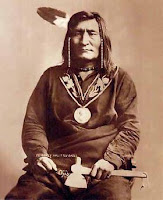
This is Philip Ahles.
You may remember
earlier posts about the Ahles family posted here.
Well, it happened again. Out of the blue, I got a call, this time at work. It turned out to be a rather industrious young man who took the time to track me down. He wanted to share some
St. Vincent history he had come across in his family history research. His name is Mike Schlenker, a descendent of the Ahles family who settled in 19th century St. Vincent around the same time as my own families.
We decided to meet for lunch, which we did earlier this week.
He brought several copies of photographs, as well as other written information such as a photocopy of a title page and entry page of an 1884 regional business directory. I always wondered if there was a way for smaller communities to get listed when they didn't publish a local city directory, and there was as it turns out!
 |
| From the 1884-5 Gazetteer, came this business listing for St. Vincent. Note that at this time, the town's population was around 1200... |
You will notice in the listing above, under St. Vincent, several businesses listed of many sorts. One of them was "Ahles, John - brewer". According to Mike, John and his wife Louisa came up to St. Vincent from Fairbault, MN. John was a German immigrant who, according to Ahles family history, came over as a very young man with fellow German - and brewer -
Jacob Schmidt.
 |
The man in the center was identified by an Ahles family descendant as Philip Ahles. However, to me he looks like photos I've seen of Wallace Cameron, who was the Constable of St. Vincent at around this time...
|
Here we see front and center, Philip Ahles. Mike swears Philip was never known to the family as being a law man, despite the star on his chest, and speculates it was there as a joke. Who knows what the reason may have been - a joke, a temporary deputization - it's one of those family mysteries we will never know. Suffice it to say, there is enough intrigue in the picture as is. For instance, it shows a winter scene with little snow but a sled in use for cutting firewood by the looks of it. We can see an engine of some sort, probably steam, mounted on the bed, with rather fancy advertising painted on it stating "
P. Ahles Blacksmith St. Vincent". A large saw with a guard can be seen at the back. The photo was taken somewhere in St. Vincent, but there's not enough clues in the photograph to estimate where exactly. It's possible it was around back of the Ahles blacksmith shop. No matter. I love a taste of the everyday of the old town, and here it is! Speaking of which, continue on below for more...
 |
| P. Ahles (far left) and friends, circa 1905... |
Here is the fabled (I say fabled, because I was told of it often enough growing up by first my Grandmother, and then my Mom...!) blacksmith shop owned by Philip Ahles. That's Philip on the left, by the way. Philip was born January 31, 1882 in St. Vincent. AP lifelong resident, he opened his blacksmith shop when he was 22 years old. Over the years, he did other jobs in the area, working as a carpenter, tool sharpnener, as well as a lineman for the local rural telephone company.
Notice the wooden sidewalk out front. I came across a mention of those wooden sidewalks recently in some other research I've been doing but can't remember what the context is at the moment. I remember that they were considered quite an addition to modernizing the town, and residents were quite proud of their installation.

Here we see the interior of the smithy. Philip is at the anvil in the picture. You may or may not be able to make out, on the left-hand side of the picture, part of a sign. Even on the original from which this came, it was partially cut off, but enough was visible at the bottom of it to make out "...Please Don't Ask!" - we speculate it may have been a sign about asking for credit!

Eventually, Philip did what many in his position did due to changing technology - he adapted. He made over his blacksmith shop into an auto repair shop.
Mike said that older relatives had fond memories of Philip. He was a bachelor uncle (my Dad had one or two of those that he greatly admired!) and nephews and nieces envied what they perceived as his freedom to do what he wanted, when he wanted. He in turn enjoyed them. Teasingly, it was said of him that he had, however, an allergy to soap and water. Well, when you live alone, and work with machines, it is not to be unexpected. I can tell you about many people years ago that smelled of their work mixed with a little sweat, whether it was grain chaff or from cutting onions in the kitchen, digging dirt in the garden, or whatever. Good hard work and the results thereof was (and is) nothing to be ashamed of...
Philip passed on, on October 19, 1967. I was 8 years old then, and faintly remember his name being mentioned. I can't say I remember the man, unfortunately. Today, Philip hangs out where many older residents ended up, the St. Vincent Cemetery. There his body lies, as the old phrase goes, with many other loved ones, including my father, my grandparents, my great grandparents, and many cousins and an uncle. But that,
THAT is another story...





















